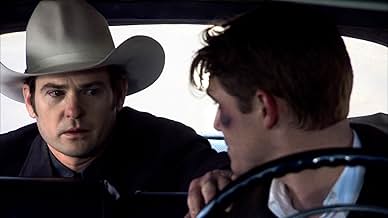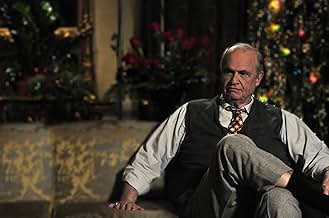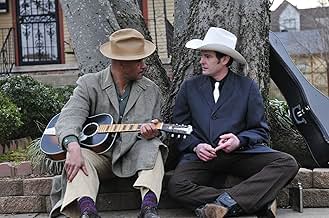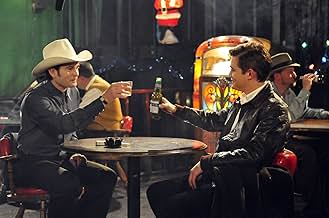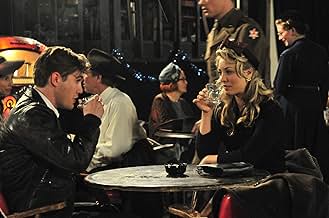Ende 1952, die besten Jahre in Hank Williams' Karriere liegen hinter ihm, heuert er ein einheimisches Kind an, das ihn durch die Appalachen für zwei Neujahrsshows in West Virginia und Ohio f... Alles lesenEnde 1952, die besten Jahre in Hank Williams' Karriere liegen hinter ihm, heuert er ein einheimisches Kind an, das ihn durch die Appalachen für zwei Neujahrsshows in West Virginia und Ohio fährt.Ende 1952, die besten Jahre in Hank Williams' Karriere liegen hinter ihm, heuert er ein einheimisches Kind an, das ihn durch die Appalachen für zwei Neujahrsshows in West Virginia und Ohio fährt.
- Regie
- Drehbuch
- Hauptbesetzung
Fred Thompson
- O'Keefe
- (as Fred Dalton Thompson)
Mark Whitman Johnson
- Trooper
- (as Mark W. Johnson)
Matt Lindahl
- Store Singer
- (as Matthew Lindahl)
Empfohlene Bewertungen
Harry Thomason's The Last Ride made me very self and health conscious.
My mind wondered throughout most of its' transitions about my own health, as the driver Silas - played by Henry Thomas - throughout most of the ride there, gradually became less and less of a chronic cigarette smoker as a result of seeing his mysterious passenger in the backseat slowly coughing and struggling to death more and more for fresh air, a pack of smokes, or newer bottles of alcohol.
By the time they get to the last gas station, before The Last Ride's ultimate climax, I think Silas, unnoticeably quits smoking, before a girl at the pump tells him he is this gas stations last customer. The owner of it died last year of a black lung so this is the gas stations last night of being open for business.
The Last Ride starring – that's right – Jesse James as Hank Williams is about Hank Williams' last ride out, to a show somewhere in West Virginia. Two things I considered high brow about The Last Ride are as follows. One thing was The Last Ride, wasn't nearly as autobiographical as you could imagine any movie about a legendary country singer like, say Ray Charles, or Johnny Cash being, as much as it was more so about his last ride, in a literal sense, out to some gig he had in a random place and the relationship he developed with the young man, Silas, employed to get him out there safely.
Williams was an alcoholic and chronic cigarette smoker too so it was the drivers' responsibility to get out there sober, while Silas is already worried about getting him out there alive. Another thing was how obvious Thomason didn't make the identity of Williams as a legendary country singer. I had to get out my laptop for research on the last ride to figure out who the mysterious passenger was because I don't think they ever tell you throughout this picture.
Altogether I would say the last ride is about Hank William's posthumous fame.
Silas doesn't listen to the radio so all he knows about his mysterious passenger the whole way there is that he is an alcoholic musician that carries a gun and won't stop being incredibly mean to him, while scolding him all of the time for calling him sir. But the funnier thing about that is Williams won't give Silas any other name to refer to him as.
I think Silas learns of his passenger's traveling name by accident through a long distance phone call he has with an employer who is supposedly his employer, played by some guy whose been a senator for Tennessee for a couple of years and he didn't even mean to give Silas that information. Silas wasn't even supposed to have this guy's number because he is not in fact who originally hired this driver. It's just a weird movie, whose overall story structure run on a lot of obscure Lynchian fuel that you may have seen in either Lost Highway or Refn' latest nominated Drive, starring Ryan Gosling.
The aesthetic liberties taken with the mechanics of The Last Ride's story structure is what I think makes up for all that it lacks in cinematography. You can tell they had a budget during the filming of The Last Ride. Altogether in retrospect I see The Last Ride as a hood classic whose mystery comes from what the film doesn't tell you throughout its' duration, about what is actually taking place.
Audiences shouldn't go into the last ride knowing who that mysterious musician alcoholic passenger is. Aside from all of the mystery, movies like that about people with fighting chances that they can't stop blowing are usually touching to general audiences because the premise of them is normally in regards to their last chance and the main character of every movie like that never knows how close he is to that last breath, much like each and every one of us.
The conservative nature of The Last Ride's scheme is what I think keeps it from venturing too far into anything sentimental or philosophical so its' a lot more chill and a lot less bias than most autobiographical films usually are.
My mind wondered throughout most of its' transitions about my own health, as the driver Silas - played by Henry Thomas - throughout most of the ride there, gradually became less and less of a chronic cigarette smoker as a result of seeing his mysterious passenger in the backseat slowly coughing and struggling to death more and more for fresh air, a pack of smokes, or newer bottles of alcohol.
By the time they get to the last gas station, before The Last Ride's ultimate climax, I think Silas, unnoticeably quits smoking, before a girl at the pump tells him he is this gas stations last customer. The owner of it died last year of a black lung so this is the gas stations last night of being open for business.
The Last Ride starring – that's right – Jesse James as Hank Williams is about Hank Williams' last ride out, to a show somewhere in West Virginia. Two things I considered high brow about The Last Ride are as follows. One thing was The Last Ride, wasn't nearly as autobiographical as you could imagine any movie about a legendary country singer like, say Ray Charles, or Johnny Cash being, as much as it was more so about his last ride, in a literal sense, out to some gig he had in a random place and the relationship he developed with the young man, Silas, employed to get him out there safely.
Williams was an alcoholic and chronic cigarette smoker too so it was the drivers' responsibility to get out there sober, while Silas is already worried about getting him out there alive. Another thing was how obvious Thomason didn't make the identity of Williams as a legendary country singer. I had to get out my laptop for research on the last ride to figure out who the mysterious passenger was because I don't think they ever tell you throughout this picture.
Altogether I would say the last ride is about Hank William's posthumous fame.
Silas doesn't listen to the radio so all he knows about his mysterious passenger the whole way there is that he is an alcoholic musician that carries a gun and won't stop being incredibly mean to him, while scolding him all of the time for calling him sir. But the funnier thing about that is Williams won't give Silas any other name to refer to him as.
I think Silas learns of his passenger's traveling name by accident through a long distance phone call he has with an employer who is supposedly his employer, played by some guy whose been a senator for Tennessee for a couple of years and he didn't even mean to give Silas that information. Silas wasn't even supposed to have this guy's number because he is not in fact who originally hired this driver. It's just a weird movie, whose overall story structure run on a lot of obscure Lynchian fuel that you may have seen in either Lost Highway or Refn' latest nominated Drive, starring Ryan Gosling.
The aesthetic liberties taken with the mechanics of The Last Ride's story structure is what I think makes up for all that it lacks in cinematography. You can tell they had a budget during the filming of The Last Ride. Altogether in retrospect I see The Last Ride as a hood classic whose mystery comes from what the film doesn't tell you throughout its' duration, about what is actually taking place.
Audiences shouldn't go into the last ride knowing who that mysterious musician alcoholic passenger is. Aside from all of the mystery, movies like that about people with fighting chances that they can't stop blowing are usually touching to general audiences because the premise of them is normally in regards to their last chance and the main character of every movie like that never knows how close he is to that last breath, much like each and every one of us.
The conservative nature of The Last Ride's scheme is what I think keeps it from venturing too far into anything sentimental or philosophical so its' a lot more chill and a lot less bias than most autobiographical films usually are.
"The Last Ride" portrays the last days of legendary country western artist Hank Williams who died on New Year's Day in 1952 while traveling to a concert in Canton, Ohio. There is none of the smarmy sentimentality of the 1964 biopic You're Cheatin' Heart starring George Hamilton. Henry Thomas' Williams never sings a line or strums a chord. Instead, we see him staring waxy- eyed from the back seat of his Cadillac as he slowly succumbs to both substance and alcohol abuse and the residual affects of childhood Spinal Bifida. Occasionally he directs a pointed barb toward his newly hired driver who is frantically trying to get his celebrated passenger (the driver never seems to be aware of who his passenger actually is) to the appointed destination. It is this serendipitous pairing and resulting relationship of these two men, one celebrity and the other a ne'er do well, that is the heart, indeed the only real focus, of the film. By fits and turns, what starts as a cold, cold heart towards most of the rest of the world warms to one of a genuine love and respect between two people who can, in the end, truly call each other friends. As far as I know, this film has only shown in Arkansas and Louisiana to date. It deserves a much wider release and more critical review. It is one of the best movies of 2011.
I've never seen "The Car Hank Died In" in Nashville, so I can't tell if it's accurate. But at one point in the film, Hank was extolling it's virtues as a "ElDorado". The first ElDorados were made in 1953. They made 503, a figure widely argued as plus or minus a couple. It's signature wrap around windshield, the first, was still an inexact science, as glass changes when it cools. The bodies were hand built to fit the windshields, and both were slightly unique. Good movie, though. Since I have to write ten lines I will add my appreciation for the curious relationship between Sir Hank and the Driver. I love Hank's music, and a contemporary reported his reading girls' dime novels and explaining that there was where his lyrics came from. Like..."Your Cheatin' Heart Will Tell On You.". Yes Sir, it will.
Hank Williams is the one I cite as my favorite singer, period. I was exposed to the man's beautifully written, elegantly sung music several years ago, mostly from my grandfather - a connoisseur of classic country - and haven't stopped listening since. His songs possess a uniformed honesty and emotional resonance that is greatly lacking in every genre of music today, regardless of what you're a fan of. His music hits the warmest notes along with the coldest notes, turning every song-topic into a ballady, poetic work of incomparable and, for the time, subversive art. He is a singer that, in my opinion, contributed more to a genre in sixteen years than some artists do in a lifetime in the industry.
It would seem that with TimeLife releasing many of Hank Williams' previously unreleased music and interviews and a film even being made on the man that Williams fans are still willing to pay hard-earned money for his work even though he has been dead for decades. I was always sort of mean-spirited to the thought that Johnny Cash could get a brilliantly-made biopic with A-list actors and accolades-galore but the real pioneer, Williams, couldn't so much as get an hour-long TV special about his impact and legacy on a genre.
Well, now he at least has something; a film that details the infamous cross-country trip he took with an ill-prepared soul who wasn't even in store for the mental-strain and time-crunch it would take to get the singer to his shows in the briskest of weather, let alone his death in the backseat of the Cadillac they were driving in. Harry Thomason's The Last Ride proudly boasts its subject as "music's original bad boy" but gives him a film about as tame as a house-cat. This is a tired, by-the-numbers biopic that does little to emphasize the true beauty of Williams' as an artist and makes the young twenty-nine year old seem nothing more than a bitter codger whose achievements and accomplishments as nothing but accidental and a footnote in the creation of a huge, cultural genre.
The plot: Silas (Jesse James), a young mechanic, is given the job as Hank Williams' (referred to as either "Luke" from his pen-name "Luke the Drifter" or "Mr. Wells," as directed by his old driver) driver in the late December month so that he can make his shows in West Virginia and Ohio, respectively. He is implored to prevent Williams, er, Wells from drinking and getting too rowdy, but this man, myth, and legend won't listen to some backwoods hillbilly who don't know nothing' about sorrow and woe. They set off in a bright blue Cadillac and attempt something of a mutual understanding.
Williams is portrayed by Henry Thomas, who looks like 25% Hank Williams and 75% Brad Paisley. It's no bother, though, as he shows his competence for low-key material and humble dialog. However, writers Howard Klausner and Dub Cornett gives Thomas not much of a character. They somehow managed to turn Hank Williams, the godfather of country music and outlaw-isms, into a psychotic, shallow lunatic with a small giddiness for adventure and a caricature to house deep-rooted drug and alcohol problems.
This is one of the strangest biopics in recent memory. It focuses on a huge man in one of his worst times with no indication or backstory on how he exactly got to the lows he is currently in, predicates itself off of an event that is interesting for a certain period of time before it becomes redundant, features a soundtrack of country songs not performed by the original artists, and bears only four songs even written by its subject that aren't even performed by him. The Johnny Cash biopic Walk the Line at least found an actor who could sing Cash and sing him soulfully and majestically. The Hank Williams biopic barely even lets the subject's name be uttered at an audible level. What kind of loyalty and respect is that when you make a film about a singer but won't go as far as to let the audience hear one song by the man, let the actor portraying him to sing one song by the man, or even let his name be spoken? The southland is seen in a crisp, highly pictorial light, but it's all too much like a postcard, with little depth or interest in what made Williams truly embrace the culture and the atmosphere of it. The south and its norms played a significant part in Williams' songs and so did the topics of love and loss. Such themes are wholly absent here. I iterate the point that if the film began as a traditional biography, from the beginning to end of its subject life, it would be far more stable and less frazzled. Despite focusing on a specific point in the life of Williams, it still feels thin and unexploited.
The fact that it at least has a potency in its southern visuals and solid direction is all well and good, but to what reward? A bigger Hank Williams fan than me I see soul-crushed and deeply hurt at the wasted opportunity here. A person looking simply for a biopic and a lesson on an extremely important musical and cultural figure will likely be letdown because of the film's lack of humanization or narrative depth. The Last Ride clocks in as one of the most disappointing films of the year. No matter how it struggles and strives, it never got out of its dullness alive.
Starring: Henry Thomas, Jesse James, and Fred Dalton Thompson. Directed by: Henry Thomason.
It would seem that with TimeLife releasing many of Hank Williams' previously unreleased music and interviews and a film even being made on the man that Williams fans are still willing to pay hard-earned money for his work even though he has been dead for decades. I was always sort of mean-spirited to the thought that Johnny Cash could get a brilliantly-made biopic with A-list actors and accolades-galore but the real pioneer, Williams, couldn't so much as get an hour-long TV special about his impact and legacy on a genre.
Well, now he at least has something; a film that details the infamous cross-country trip he took with an ill-prepared soul who wasn't even in store for the mental-strain and time-crunch it would take to get the singer to his shows in the briskest of weather, let alone his death in the backseat of the Cadillac they were driving in. Harry Thomason's The Last Ride proudly boasts its subject as "music's original bad boy" but gives him a film about as tame as a house-cat. This is a tired, by-the-numbers biopic that does little to emphasize the true beauty of Williams' as an artist and makes the young twenty-nine year old seem nothing more than a bitter codger whose achievements and accomplishments as nothing but accidental and a footnote in the creation of a huge, cultural genre.
The plot: Silas (Jesse James), a young mechanic, is given the job as Hank Williams' (referred to as either "Luke" from his pen-name "Luke the Drifter" or "Mr. Wells," as directed by his old driver) driver in the late December month so that he can make his shows in West Virginia and Ohio, respectively. He is implored to prevent Williams, er, Wells from drinking and getting too rowdy, but this man, myth, and legend won't listen to some backwoods hillbilly who don't know nothing' about sorrow and woe. They set off in a bright blue Cadillac and attempt something of a mutual understanding.
Williams is portrayed by Henry Thomas, who looks like 25% Hank Williams and 75% Brad Paisley. It's no bother, though, as he shows his competence for low-key material and humble dialog. However, writers Howard Klausner and Dub Cornett gives Thomas not much of a character. They somehow managed to turn Hank Williams, the godfather of country music and outlaw-isms, into a psychotic, shallow lunatic with a small giddiness for adventure and a caricature to house deep-rooted drug and alcohol problems.
This is one of the strangest biopics in recent memory. It focuses on a huge man in one of his worst times with no indication or backstory on how he exactly got to the lows he is currently in, predicates itself off of an event that is interesting for a certain period of time before it becomes redundant, features a soundtrack of country songs not performed by the original artists, and bears only four songs even written by its subject that aren't even performed by him. The Johnny Cash biopic Walk the Line at least found an actor who could sing Cash and sing him soulfully and majestically. The Hank Williams biopic barely even lets the subject's name be uttered at an audible level. What kind of loyalty and respect is that when you make a film about a singer but won't go as far as to let the audience hear one song by the man, let the actor portraying him to sing one song by the man, or even let his name be spoken? The southland is seen in a crisp, highly pictorial light, but it's all too much like a postcard, with little depth or interest in what made Williams truly embrace the culture and the atmosphere of it. The south and its norms played a significant part in Williams' songs and so did the topics of love and loss. Such themes are wholly absent here. I iterate the point that if the film began as a traditional biography, from the beginning to end of its subject life, it would be far more stable and less frazzled. Despite focusing on a specific point in the life of Williams, it still feels thin and unexploited.
The fact that it at least has a potency in its southern visuals and solid direction is all well and good, but to what reward? A bigger Hank Williams fan than me I see soul-crushed and deeply hurt at the wasted opportunity here. A person looking simply for a biopic and a lesson on an extremely important musical and cultural figure will likely be letdown because of the film's lack of humanization or narrative depth. The Last Ride clocks in as one of the most disappointing films of the year. No matter how it struggles and strives, it never got out of its dullness alive.
Starring: Henry Thomas, Jesse James, and Fred Dalton Thompson. Directed by: Henry Thomason.
There are some value in the film but I would watch it while doing something else. Which I did.
Wusstest du schon
- WissenswertesOn December 30, 1952, Hank Williams hired Charles Carr, a freshman at Auburn, to drive him in his 1952 powder-blue Cadillac from Montgomery, Alabama to shows in Charleston, West Virginia and Canton, Ohio. Snow fell most of the way. The afternoon of December 31, Williams learned that snow had canceled his flight to Charleston. They checked into a Knoxville hotel. The hotel porters had to carry Williams, under the influence of two shots of morphine, to the backseat of the limo when it was decided that they would drive to Canton. The next morning, in Oak Hill, West Virginia, Carr found Williams dead, lying in the same position in which the porters had placed him. Carr remained in Montgomery and worked in investment and real estate until he retired. He died in July 2013, at age 79.
- PatzerAfter agreeing to hire him, Stan tells Silas: "Be at this address Monday at 8:00." When Silas picks up Mr. Wells, "December 30, 1952" is on the screen. December 30, 1952 was actually a Tuesday.
Top-Auswahl
Melde dich zum Bewerten an und greife auf die Watchlist für personalisierte Empfehlungen zu.
- How long is The Last Ride?Powered by Alexa
Details
- Erscheinungsdatum
- Herkunftsland
- Offizielle Standorte
- Sprache
- Auch bekannt als
- Последняя поездка
- Drehorte
- Sherwood, Arkansas, USA(Roundtop Filling Station where Silas meets the female attendant who he asks for a date)
- Produktionsfirmen
- Weitere beteiligte Unternehmen bei IMDbPro anzeigen
Box Office
- Budget
- 9.000.000 $ (geschätzt)
- Bruttoertrag in den USA und Kanada
- 27.000 $
- Eröffnungswochenende in den USA und in Kanada
- 16.270 $
- 23. Okt. 2011
- Weltweiter Bruttoertrag
- 27.000 $
- Laufzeit1 Stunde 42 Minuten
- Farbe
Zu dieser Seite beitragen
Bearbeitung vorschlagen oder fehlenden Inhalt hinzufügen







